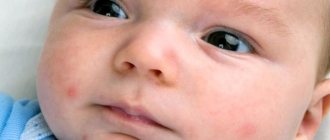Play "ARVI"
Roles performed by:
- Relatives. They make sure that the mother takes care of the baby properly.
- Microbe . Small, nimble. Penetrated into the child's body. Goal: to survive and give birth to preserve your family.
- Child. An innocent blond child of two years old.
- Immunity. Ready to repel the virus attack.
- Mother. Loving, caring. Capable of making sacrifices for the sake of the baby. Competent. Knows the Internet, Google. Able to find useful information.
- Mom's employer. Pays money with which a mother can buy treats for her baby. Doesn't tolerate sick leave - threatens to fire him.
At the end of the article we have prepared additional material for you. Download recipes for simple and effective drinks that will strengthen your baby’s immunity in autumn and winter!
- Doctor. A good man with a small salary. Literate. He wants to subscribe to medical newspapers and magazines, go to conferences - even the clinic does not have the funds for this. He tells his mother about illnesses clearly. Greets visiting representatives of pharmaceutical companies who talk about new drugs that help treat diseases: medicine is constantly developing, and they send you to advanced training courses once every five years.
- Medical representative Representative of a pharmaceutical company. Unobtrusively encourages the doctor to prescribe new medications, promising to pay for participation in an important conference, to bring a new white coat, the latest medical almanac. Receives bonuses for fulfilling the sales plan.
- Pharmacy employee. He will sell any remedy prescribed by a doctor or give the most effective one in his own opinion. Representatives of pharmaceutical companies also visit him. You know what and how much you need to sell in order to receive a bonus from the company. Salary also directly depends on the amount of revenue in the pharmacy.
- Pharmaceutical company. Produces medicines, sells them and makes a profit. Contains a staff of trainers who train representatives to clearly and convincingly tell doctors and pharmacy employees why their drug should be sold. He knows that Mom consults Google. Ensures that information about medications is prominently displayed on the Internet and appears in contextual advertising. Sometimes he pays extra for posting reviews of his medications.
ARVI
(Tragedy in one short part)
Virus: - What a suitable child! Now, now I will be in it...
Immunity: - What? Now I’ll give it as much as I can! You'll know how to get around here! Hey, leukocytes, fas!
Child: - My throat hurts, my snot is running and I can’t breathe!
Relatives to mom: - Do something!
The mother grabs the child and runs to the doctor: - Doctor! What about him?
Doctor: - He has ARVI. Rest, drink and moist air!
Mom (remembering the employer): - Prescribe something very, very modern so that you can recover in three days and not be sick again!
Doctor (remembering the medical representative): - Well, if you want, there is one remedy... (writes out a prescription)
Mom at the pharmacy: - Give me this medicine quickly!
Pharmacist: - It's expensive!
Mom: - So much the better!
Pharmacist: - Then take this too, so that you will definitely get better!
Mom: - Do you have anything to eat so that you don’t get sick anymore?
Pharmacist (remembering the medical representative and the promised bonus): - Why! Here, here and here!
Pharmacist, medical representative and manufacturer: - How good, how good we work, guys!
The mother gives the child everything she bought.
Virus: - What is this? I feel so uncomfortable! Okay, I’ll hide until better times...
Leukocytes: - Whom to take?
Immunity: - He was here somewhere!
Leukocytes: - Where? False call! We won't go there again!
Mom in the morning: - How good! No temperature! You can go to kindergarten too! And I’m off to work!
Second virus: - Oh, what a wonderful child... now, now...
Child: - Oh, I feel bad!
The second virus to the first virus: - Oh, brother, and you are here! Let's get down to business together!
Immunity: - Alarm! Viruses are coming!!! Hey leukocytes!
Leukocytes: - This is a false alarm. We swam, we know!
Mom: - Well, what is this! I got sick again, oh my!
Jokes aside. We have noticed: children whose parents practically do not care for them do not get sick. Mothers who “give all their blood to their little one” get sick almost continuously. What's the matter? The secret is simple: first mothers do not interfere in the physiological processes of the body, and second mothers interfere, doing a disservice to their beloved child.
At the end of the article we have prepared additional material for you. Download recipes for simple and effective drinks that will strengthen your baby’s immunity in autumn and winter!
Folk remedies
Traditional methods of strengthening the immune system are simple, effective and safe.
Onion and garlic
Children often refuse this healthy “couple”: they are confused by the taste and smell of vegetables.
Therefore, parents should use a trick: finely chop green onions and add them to foods familiar to the child, and dissolve a crushed clove of garlic in the soup: while the broth cools, the smell and bitterness will disappear. Garlic can be used to make a useful “talisman”.
To do this, take a plastic container from a toy, for example, from a Kinder Surprise, pierce it in several places with an awl, and attach a ribbon pendant.
Then you need to put a chopped clove of garlic in a box and hang the “pendant” around the baby’s neck. To ensure that the child wears such a device with pleasure, the box can be designed in the form of a bee, fish or funny man.
Honey and lemon
If a child is not allergic to bee products, then honey is an excellent way to maintain immunity. Buckwheat and linden varieties are especially useful.
Honey should be added to tea or water, 1 tsp. per day, it is an excellent substitute for sugar. Your baby will love a real immune cocktail - a mixture of honey and lemon juice, diluted in 100 g of water.
Berries and herbs
Decoctions of chamomile and linden blossom or rose hips will help strengthen the body's resistance. You can give your baby herbal drinks by sweetening them with honey (½ tbsp).
Cranberry improves immunity best . You can freeze it and then add a small amount of berries to warm black tea, after grinding it with sugar or honey. It is better to give this drink to a child in the first half of the day, during periods of colds and viruses.
Fish fat
This immune remedy has been known for a long time. Its benefit lies in polyunsaturated fatty acids, which are essential for health.
The most important among them is omega-3, which the body cannot produce on its own, and its deficiency has a detrimental effect on the immune system. Previously, fish oil was given to children in kindergartens 1 tsp, and its taste was unpleasant due to the poor quality of purification.
Today this medicine is produced in the form of capsules that you simply need to swallow. But even in liquid form, the product does not have an unpleasant, specific taste or odor, since it undergoes a multi-stage purification system.
Fish oil is a godsend for children who are often sick. But it is important to remember about the dosage: an excess of this useful dietary supplement is just as dangerous as its deficiency.
Immunity
The world is cruel: some living beings strive to take the lives of others. Not because the evil ones are the only way they can survive. Man is no exception. He is also being hunted. Millions of bacteria, fungi, viruses, and protozoa every second try to penetrate the body of Homo sapiens, but fail: over thousands of millennia, humans have developed several lines of defense. Including immunity.
Simplified: immunity is an entire army of cells consisting of special forces. They recognize objects harmful to the body (microbes, tumor cells), remember them, and destroy them. The army has two regiments:
- rapid response is called “innate immunity” (nonspecific);
- shock action - elite special forces are proudly called “acquired immunity” (specific).
Congenital is called nonspecific for a reason. It reacts in exactly the same way to the penetration of any enemy - creates unbearable conditions for the alien - increases temperature, pressure, makes the blood move faster. If the virus is weak, this will be enough to destroy it. If a strong, innate immune system slows down its spread until the special forces arrive, it will be acquired immunity. Not right away, because the “soldiers” must study the enemy and develop destruction tactics. The first group of “special forces” blood cells marks aliens with a special marker: “alien - kill”, the second group of cells shoots all aliens with such a marker, and the third removes their remains so that the blood is not littered with something unknown. The first group remembers the enemy. The next time he meets, he will react instantly.
Baby under protection
A woman, while carrying a baby, protects him from the aggression of the outside world with her body. Moreover, the placenta allows the mother’s antibodies to reach the baby, and after birth he will use them for another year - to have protection from all the viruses and diseases that his mother has already encountered. What will happen then, in a year?
By the age of one year, the effect of maternal antibodies ceases simply because the blood has been completely renewed and these cells have disappeared. The baby will have to develop its own specific immunity.
How do you feel about the fact that a child, before he learns to eat on his own, will soil hundreds of vests and blouses? Fine? This is a natural process! A baby can’t immediately learn to chew solid food! Need to practice! How do you feel about the fact that before a child can run confidently, he will hit a hundred bumps and fall a thousand times? Fine? Natural process! Need to practice! Why do you demand that the immune system immediately work at full capacity, without making allowances for the natural processes of its “training”?
The immune system should also strengthen. And he grows stronger by encountering new microbes and mastering the skills to fight them.
Nutrition
How to boost your child’s immunity - first of all, think about proper nutrition.
Normalization of nutrition is one of the main tasks in establishing the body’s protective activity. The immune system needs a varied and healthy diet including:
- Water, compotes, jelly - the child should drink at least a liter of liquid per day;
- Proteins of animal and plant origin are cell builders;
- Fats that are involved in the absorption of vitamins and minerals;
- Proper carbohydrates are a source of additional energy;
- Fermented milk products to ensure the normal functioning of the gastrointestinal tract;
- Vegetables and fruits are a plant resource of essential beneficial vitamins, substances and fiber that cleanse the body;
- Honey and bee products to strengthen the immune system.
Necessary active substances contained in the products:
- Vegetables, legumes, nuts, seafood - contain magnesium, which improves blood supply to tissues and organs, cleanses the body of toxins;
- Poultry, cheese, garlic, onions, apples, buckwheat, figs contain zinc, which creates a natural barrier to viruses and bacteria;
- Beef liver, buckwheat, apples, beef introduce the necessary iron into the body, which ensures the transfer of oxygen through the cells, high hemoglobin;
- Fish oil, seafood, buckwheat, oats, legumes, milk, kefir, cheese contain iodine, which increases protective functions and improves blood;
- Poultry meat, garlic, legumes, sea fish, eggs, pistachios contain selenium, which is involved in the production of antibodies and improves hematopoietic functions.
It is important for a child’s body to get vitamins from food, since complexes for the age of three are in most cases allowed from the age of five. A growing body needs vitamins:
- D3 - stimulates the activity of the immune system - fatty varieties of sea fish, eggs;
- C - responsible for metabolic reactions - red and black berries, kiwi, sauerkraut, fresh herbs;
- A - helps in the functioning of the human cardiac and circulatory systems, protects vision - apricots, persimmons, prunes, carrots;
- Group B - a vitamin group that increases the resistance of the immune system, improves the passage of biochemical reactions in cells - tomatoes, cottage cheese, eggs, poultry, buckwheat, pork, herbs, sunflower seeds, currants, plums, fish;
- E - effectively increases the number of antibodies to fight infections - almonds, hazelnuts, vegetable, sunflower, corn oils, legumes, walnuts, cabbage, green onions, apricots, peaches, dairy products;
- K - improves hematopoietic function, helps the liver cleanse the blood of toxins from pathogens and viruses - beef, parsley, onions, strawberries, cod, liver, broccoli, peas, celery, tomatoes, zucchini, dates, raisins, garlic;
- P - enhances the effect of immune forces during inflammation - apricots, apples, grapes, cherries, plums, buckwheat;
- PP - normalizes redox processes in cells, stabilizes the functioning of nerve cells, helps ensure the normal functioning of internal organs, strengthens the immune system - wheat, hazelnuts, peas, beef liver, champignons, chicken meat.
How does this happen?
Virus No. 1 enters the body. Nonspecific immunity reacts - the temperature rises, weakness, drowsiness, and headache appear. The work of specific immunity immediately starts. The cells recognize dangerous aliens and mark them. Then it takes some time, usually 3-5 days, to develop specific antibodies that can only cope with these viruses No. 1. These antibodies cope with the virus and the person recovers.
Then viruses No. 2, 3... 123 enter the body - the process starts again, again and again.
If, after some time, the baby’s body encounters virus No. 1 or any already familiar virus, then specific immunity will immediately react, instantly producing the necessary antibodies. And the baby won’t get sick!
Cooking
You need to prepare healthy foods for children correctly. So, vegetables have the greatest value in their raw form, but if you need to cook them, it is better not to boil them, but to steam them. Frozen meat and fish should be thawed at +1–4°C in the refrigerator. Defrosting food in water is not recommended. By following these simple rules, you will retain most of the nutritional content of your food.
The critical period is from one to three years?
The timing of the critical period, when children begin to get sick often and a lot, coincides with the beginning of active communication:
- If there are older children in the family, then the one-year-old baby will begin to get sick often, “catching” infections from him.
- If there are no older children, ARVI flourishes at the beginning of kindergarten, when the baby is faced with a massive attack of unfamiliar microbes (see the article Rotavirus infection in children or Hello, kindergarten!)
- If you don’t go to kindergarten, the peak incidence will be in first grade.
A child can get sick 6-12 times a year! Parents say: “He goes to kindergarten for a week, sits at home for three weeks.” And this is... the norm!
What should mom do?
The saying of old doctors: “ARVI, if treated, goes away in one week, and if not treated, then in seven days.”
- If you do not interfere with the functioning of the immune system, it will become stronger and after a year or two your child will no longer get sick often.
- If you start feeding your child antibiotics (which have no effect on viruses!!! at all!!!), newfangled immunomodulators and other means, you are interfering with the natural training of the immune system, reducing it! The baby will get sick even from infections that he had not so long ago. You will not be sick for a year or two, but for a long, long time, and then you will definitely become chronically ill. Nature does not forgive such carelessness and a weak individual is “discarded” as not needed by evolution.
At the end of the article we have prepared additional material for you. Download recipes for simple and effective drinks that will strengthen your baby’s immunity in autumn and winter!
Treatment of ARVI:
- peace (don’t drag your baby around on activities and walks if he doesn’t have the strength);
- drinking plenty of fluids to facilitate the work of immunocompetent blood cells;
- easily digestible food and only at the request of the baby;
- fresh, cool, humidified air;
- clean linen, disposable handkerchiefs;
- calm attitude towards the situation.
The first ARVI suffered is not the last, there will be many of them. Therefore, do not plan to go to work immediately as soon as your baby is given a place in a nursery or kindergarten. Set aside for a year. It will be better for everyone.
In many countries, ARVI is not considered a disease at all, just a stage of development. Therefore, children with snot are easily accepted into kindergartens, and parents do not keep the child at home if he feels well, even with an elevated body temperature. to buy medications without a prescription . Doctors respect the immune system and give it the opportunity to develop correctly.
If you do not protect the baby from contact with children for up to a year, then he will get sick easily (almost imperceptibly) and develop his own immunity under the protection of the mother, accordingly, there will be no peak incidence in the first year of visiting a nursery or kindergarten.
Forms of release of drugs
In modern pharmacies, vitamins for children up to one year and older, designed to strengthen the immune system, are presented in a wide range. They are manufactured in the following forms:
- Powder.
- Pastilles.
- Chewable tablets.
- Marmalade candies.
- Syrup and drops.
- Gel.
When choosing a specific product, you need to focus on the child’s age and personal preferences. For babies under one year old, powders are the best choice. They dissolve in food or drinks. Children who refuse tablets are given syrups or gel. Schoolchildren often like chewing gummies or lozenges.
When does the immune system really fail?
A true decrease in immunity is said to occur when:
- the child often suffers from bacterial and fungal infections rather than viral ones;
- it is necessary to treat in a hospital, administer antibiotics by drip;
- boils, abscesses and other purulent skin diseases often occur;
- tuberculosis in the first year of life;
- HIV infection;
- There were tumor diseases and the baby was taking chemotherapy, hormones, and immunosuppressants.
There are only one such child in 15,000 , and only they need immune correction. And, rest assured, immunologists will use completely different drugs, and not those sold in pharmacies.
Other children should not be given medications that have any effect on the immune system.
Key indications and contraindications
Vitamins important for children's immunity are present in healthy foods. Carrots and liver contain a lot of retinol, and citrus fruits contain ascorbic acid. But to fill the daily requirement, you will have to eat them in large quantities. And this, in turn, can negatively affect the baby’s well-being. Therefore, experts recommend resorting to vitamin-mineral complexes. Direct indications for their use include:
- Frequent mental fatigue and stressful situations.
- Unbalanced diet.
- Increased physical activity.
- Intensive growth during adolescence.
- Seasonal exacerbations of diseases.
- Adaptation to new living conditions and climate zone.
- The presence of pathologies of the digestive system.
In such situations, the use of drugs becomes mandatory for every child, especially at the age of 1 year. Otherwise, dangerous life-threatening diseases may develop.
The use of vitamins in early childhood for preventive purposes is not recommended by most experts. Only a pediatrician can assess the advisability of using such drugs.
Like any medications, vitamin-mineral complexes have a number of contraindications. They are prohibited from being used if there is an allergic reaction to any component of the product, kidney pathologies, or if the absorption of the components is impaired. If any side effects occur, stop taking the drug immediately and seek help from a medical facility.
Immunodeficiency - yes or no?
Answer a few questions.
- Are the baby’s height and weight within the age norms?
- Is your neuropsychic development consistent with the norms?
- Do sinusitis, pneumonia, purulent otitis, purulent skin diseases occur less than 6 times a year?
- Is he hospitalized less than twice a year and receives antibiotic drips?
- Did you manage to avoid tuberculosis, oncology, HIV infection?
If all the answers are “Yes,” there is no question of immunodeficiency. If somewhere the answer is “No,” go to an appointment with a pediatrician and talk to him about this topic. It’s possible even without a child.
What do you think about immunomodulators, stimulants, vitamins, herbs, hardening and other ways to avoid frequent illnesses?










